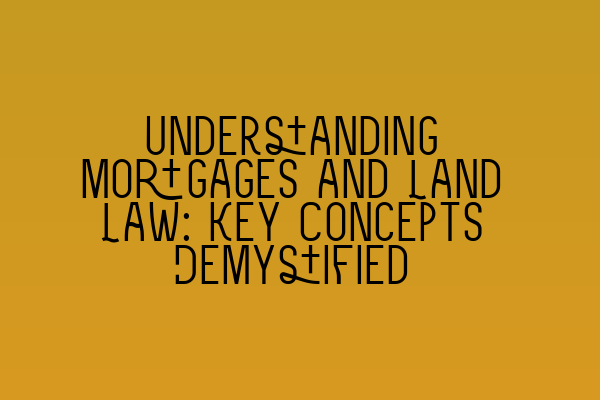Understanding Mortgages and Land Law: Key Concepts Demystified
As a property owner, buyer, or investor, understanding the intricacies of mortgages and land law is crucial to navigating the world of real estate. Unfortunately, these concepts can often be complex and overwhelming for those who are not well-versed in legal jargon. In this blog post, we aim to demystify these key concepts and provide you with a clear understanding of mortgages and land law.
1. Mortgage Basics
Let’s start by defining a mortgage. A mortgage is a legal agreement between a borrower (the property owner/buyer) and a lender (typically a bank or a financial institution) that allows the borrower to obtain funding for the purchase of a property. The property itself acts as collateral for the loan, meaning that if the borrower fails to repay the loan, the lender has the right to foreclose on the property and sell it to recover the outstanding debt.
To secure a mortgage, the borrower must meet certain criteria set by the lender, such as a satisfactory credit rating and a down payment. The terms of the mortgage include the loan amount, interest rate, repayment period, and any additional conditions agreed upon by both parties. It’s important to carefully review and understand these terms before entering into a mortgage agreement.
2. Types of Mortgages
There are several types of mortgages available, each with its own set of features and benefits. Some common types include:
– Fixed-Rate Mortgages: These mortgages have a fixed interest rate throughout the term of the loan, providing stability and predictable monthly payments.
– Adjustable-Rate Mortgages (ARMs): Unlike fixed-rate mortgages, ARMs have an interest rate that can fluctuate periodically based on market conditions. This means that your monthly payments can change over time.
– Interest-Only Mortgages: With this type of mortgage, borrowers are only required to pay the interest for a specified period, typically between 5 and 10 years. After the interest-only period, the borrower must pay both principal and interest.
– Government-Backed Mortgages: These mortgages are insured by the government, reducing the risk for lenders and making it easier for borrowers to qualify. Examples include FHA loans and VA loans.
3. Land Law Essentials
Now that we have a basic understanding of mortgages, let’s turn our attention to some key concepts in land law:
– Freehold: Owning a property in freehold means that you have complete ownership of both the land and any buildings on it. This is the most common type of property ownership.
– Leasehold: Leasehold ownership grants you the right to use and occupy the property for a specified period, typically long-term leases ranging from 99 to 999 years. The owner of the property, known as the freeholder, retains ultimate ownership.
– Easements: Easements are rights of way or use over another person’s property. Examples include the right to cross someone else’s land to access your own property or the right for utility companies to install and maintain infrastructure on private land.
– Covenants: Covenants are legal obligations tied to the ownership of a property. They can restrict certain actions or require specific obligations, such as maintaining the property in a certain condition or paying annual fees for maintenance of shared facilities.
4. Seeking Legal Advice
Given the complex nature of mortgages and land law, it’s always advisable to seek legal advice from a solicitor who specializes in property law. A solicitor can guide you through the process, ensure that all legal requirements are met, and protect your interests throughout any property transaction.
At SQE Property Law & Land Law, our team of expert solicitors is dedicated to providing comprehensive legal services to clients in all aspects of property law. Whether you need assistance with purchasing, selling, or remortgaging a property, our experienced solicitors can help navigate the complexities of the legal landscape.
To learn more about preparing for the SQE 1 exam, we recommend checking out our related articles:
– SQE 1 Practice Exam Questions: Get a head start in your preparation by practicing with our SQE 1 exam questions.
– SQE 1 Practice Mocks FLK1 FLK2: Take advantage of our SQE 1 practice mocks to assess your knowledge and identify areas for improvement.
– SQE 2 Preparation Courses: If you’re looking to advance your legal career, explore our SQE 2 preparation courses to enhance your expertise in property and land law.
– SQE 1 Preparation Courses: Learn the essential concepts and skills required for the SQE 1 exam with our comprehensive preparation courses.
– SRA SQE Exam Dates: Stay informed about the upcoming SRA SQE exam dates to plan your study schedule effectively.
In conclusion, having a clear understanding of mortgages and land law is essential for anyone involved in property transactions. By grasping the basics of mortgages, knowing the different types available, and understanding key concepts in land law, you’ll be better equipped to make informed decisions and protect your interests. Remember, it’s always wise to consult with a solicitor for personalized advice and guidance tailored to your unique circumstances.
